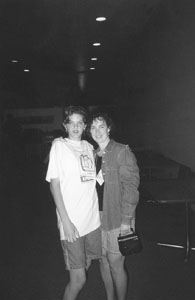DO-IT Scholars Discuss Learning Styles

On a hot summer afternoon after a long day of Summer Study activities on the UW campus, a group of dedicated DO-IT Scholars came together to discuss learning strategies. Although, for most activities, Scholars work side-by-side with people who have disabilities other than their own, DO-IT understands the benefits of opportunities to share experiences, concerns, and strategies with peers who have disabilities similar to their own. The common thread for this particular group was that each Scholar was dealing with some sort of learning issue, as a result of his/her disability. The disabilities represented included specific learning disabilities, attention deficit disorder, attention deficit hyperactivity disorder, Tourette syndrome, and head injury. First, I shared my experiences with dyslexia. Others followed as we discussed "Impacts" and "Solutions."
Each Scholar shared at least one way that a disability has impacted his/her ability to learn. Below we share our brainstorm list. We hope our ideas will benefit others.
Impacts:
- Slow at taking tests
- Slow reading
- Messy handwriting
- Difficulty expressing thoughts in writing
- Difficulty keeping up with verbal output during a lecture
- Unorganized
- Easily distracted
- Frustrated
- Feeling stupid, overwhelmed
We all agreed that our disabilities do in fact impact our ability to learn. We also agreed that we all do have the ability to learn. Our next step was to list solutions that help us succeed in academics, in spite of our learning challenges. These solutions allow us to work to our full potential and demonstrate our true abilities!
Solutions:
- Arrange for extended time on tests.
- Take tests orally.
- Outline ideas and information while reading or reviewing notes.
- Use a computer (word processor and spell check).
- Use different color pens to highlight key points.
- Use colored transparent screens to cover pages while reading.
- Use large print font on the computer.
- Use a grammar check.
- Utilize study groups.
- Talk to the instructor to find out what they would suggest doing to succeed in the class.
- Control the environment to minimize distractions.
- Study during times of the day when you have the most energy.
- Take breaks from reading to keep mind fresh.
- Tape-record lectures.
- Read out loud to yourself or have someone else read to you.
- Get notes from the teacher or another person in the class.
- Use a class planner.
In summary, we found that we have some common solutions, as well as some unique solutions. We found that a strategy that may make a difference for one person, may not help another. We also learned that we are the ones who need to figure out what works for us. Others can make suggestions, but it's up to the individual to try out an accommodation and then decide whether it provides a solution. The key is to keep trying until you find something that works! Become an expert on your disability and the accommodations that work for you.
Many of the DO-IT Scholars in this group are becoming active in the decision-making process for accommodations at school. How liberating! Once you're in college you are the decision-maker, so it is encouraging to learn that this process is beginning to take place for the Scholars. DO-IT Scholars are learning how to set and achieve their goals! We continue this ongoing process on our Internet discussion list for participants and mentors with learning issues.
As Scholars focus on their transition from high school to college and from college to career, they need to plan on adapting solutions to a new environment. Solutions that may work in a school context may not apply in a work setting. One may find, depending on what type of occupation is pursued, that more accommodations are needed at work or vice versa. I like to think of my disability as a life-long opportunity to use my creative energy to achieve success! Any other ideas?